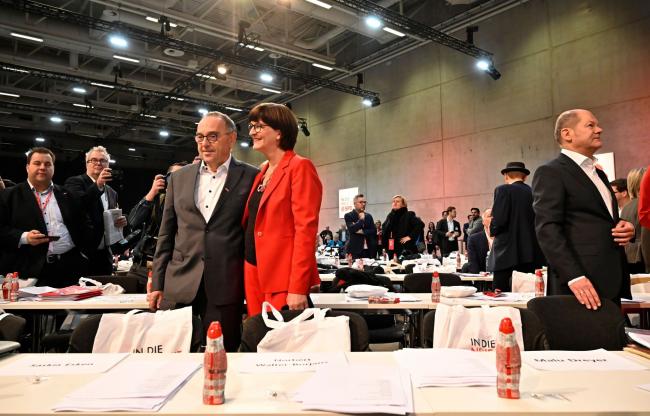(Bloomberg) -- Germany’s Social Democrats are willing to throw Chancellor Angela Merkel’s government a lifeline but only if demands including more government spending are met, according to one of the party’s newly-elected leaders.
“I was and I remain skeptical about the coalition,” Saskia Esken said at the SPD party convention in Berlin. “With this lead motion, we are giving the coalition a chance to continue. Nothing more and nothing less, however long it may last.”
Esken and Norbert Walter-Borjans, a pair of outspoken coalition critics and Berlin outsiders, won an SPD leadership contest last weekend against a tandem led by coalition loyalist Olaf Scholz, Merkel’s finance minister and vice chancellor.
Later Friday, the delegates are expected to rally behind a proposal that sets out conditions -- including an increase in the minimum wage and tougher action on climate change -- for the party to remain in the coalition with Merkel. Walter-Borjans and Esken back-peddled on previous demands that would have been difficult for Merkel’s Christian Democratic-led bloc to accept.
SPD Wish List
The three-day convention marks the party’s latest effort to get itself on track after reluctantly entering a coalition to support Merkel for her fourth term two years ago. While the party’s leaders have softened their campaign pledges, they will still be under pressure from a restive base and negotiations with Merkel’s bloc won’t be easy.
Reopening a climate package that took months to secure will find little support from the CDU and its Bavarian sister party, the CSU. Equally, increasing the minimum wage toward the SPD target of 12 euros ($13) an hour could become a major bone of contention.
Pushing too hard could be risky as pulling out of the coalition could trigger a snap election. That could be disastrous with support for the SPD on par with the far-right AfD. The CDU, led by the embattled Annegret Kramp-Karrenbauer, also has little incentive to seek an early, and Merkel is keen to see out her tenure, especially with Germany set to hold the rotating presidency of the Council of the European Union in the second half of next year.
The dynamics of the convention will give an indication of how much time Merkel has left, even if the SPD’s new leadership is stepping back from the brink.
